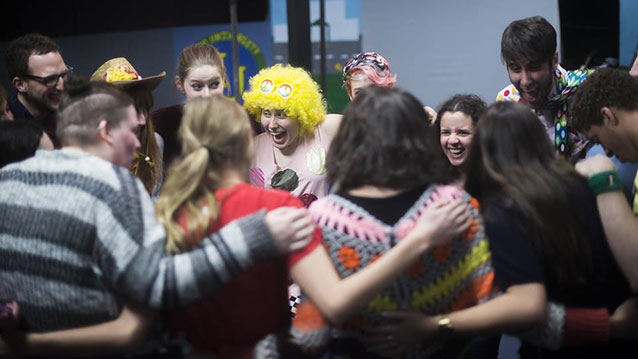This is another in a series of Q&As profiling Northwestern undergraduate researchers.
EVANSTON, Ill. --- Last summer, Emily Baldwin followed her passion to the United Kingdom, to the heart of a budding theater movement for special needs audiences.
A drama enthusiast since the age of 6, the School of Communication senior used funding from an undergraduate research grant to learn firsthand about a movement that truly has made theater a welcoming place for youth and for people with autism and other developmental differences.
Baldwin, who has spent much of her college career on the stage and behind the scenes in myriad theatrical productions at Northwestern University, visited 13 theater companies and organizations in the UK.
A highlight of her research was volunteering in Wales at Hijinx Unity Festival, which celebrates the best inclusive and disability arts from around the world.
“I believe that access to arts is a human right and that not having access to arts is a way that society tells you that you don’t matter,” Baldwin said.
She has been active in two theater groups led by Northwestern students attempting to lift the curtain for all audiences. Purple Crayon Players produces and performs theater for young audiences, while Seesaw Theatre caters to audience members living with autism and other developmental differences. Both were created on the premise that all people deserve the opportunity to experience theater.
Baldwin is the director of Seesaw Theater’s annual production this year. “We create original productions using new theatrical experiences for people who are on the autism spectrum and others with developmental differences,” she said. “We still have a long way to go, and I wanted to learn from the masters.”
Baldwin has been involved in “The Lilliput Troupe,” “Big Love” and “With Two Wings,” among other productions, and has learned a great deal about herself and her craft.
She has come to understand the limitations of traditional theater, especially where young audiences and people with special needs are concerned.
“The work that we do by creating performances designed for people who don’t want to or are unable to sit in a dark theater for two hours and quietly watch a play, that’s how we make the statement to the world that everyone deserves art,” she said.
Read more in a Q&A with Baldwin, who recently spoke to Northwestern News about her research and reflected on her time at Northwestern.
What led you to do this research project?
I’ve been involved in theater since I was 6. It opened up a whole new world to me. Now, through the student-run theater groups I work with at Northwestern, I make theater for people who are often excluded from traditional theater spaces. They are the audience I wish to serve.
How has your Northwestern education informed your professional ambition?
I came to Northwestern knowing I wanted to do theater for young audiences and theater education. Through exceptional professors, like Michael Rohd, I’ve been introduced to a whole new world of theater and community engagement.
Professor Rohd is a foundational figure in the world of civic engagement, which is basically artists using their tools as artists in conjunction with community groups. It’s really transforming theater from a performance as the end in and of itself to a tool for engagement. So that’s been totally inspiring for me.
Talk about your research and what you’ve accomplished in the U.K.
My research focused on both arts and audiences with different learning abilities. I spent time with 13 theater companies and organizations. I volunteered in Wales at Hijinx Unity Festival, which celebrates the best inclusive and disability arts from around the world. And I got to see not only the range of performances that fall in this field, but also that sense of community shared by the people responsible for it.
What role has your involvement with student theater groups had on your path?
My interest in this specific area of theater stems from the work of other students. I would not have made it to London on a research grant without Seesaw and the students who started the group. As a first-year student, I went to see their debut performance, and I was totally blown away by the artistic quality, the creativity and the impact it had. That was my inspiration.
- Polina Senderova contributed to this report.


